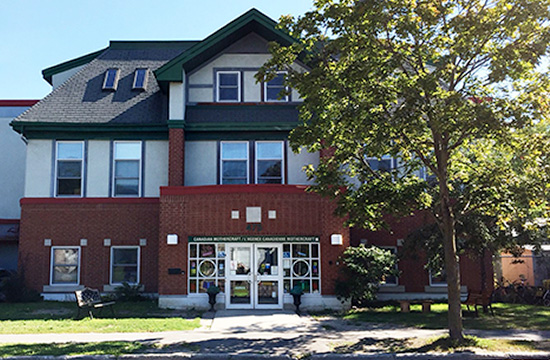Full Time Toddler Program
Full Time Toddler Program
Our Toddler Program welcomes children aged 18 months to 30 months, with a maximum group size of 15 children.
Our program focuses on valuing and enhancing the unique personality and developmental skills of each toddler in a safe, happy and nurturing environment.
Our Toddler Program is structured with snack, lunch, nap and outdoor play times, as outlined in the Toddler Schedule below. All the children follow the same daily schedule, which is finely tuned to meet their developmental needs.
One part-time and three full-time Educators facilitate the program maintaining Ministry requirements and meeting the social and emotional needs of your child.
We appreciate how difficult it can be for parents to leave their child with us, which is why we’ve created a process that takes into account the needs of both the parents and the toddler and integrates your child into the program in a gradual way.
The core values underlying our Toddler Program
Learning Environment for Fostering Developmental Growth
Play is more than just “fun” for toddlers. It’s how they learn.
Play is essentially a child’s “work” and helps their brains grow while also being a lot of fun. It helps build confidence, develop social skills, language and communication, learn about caring for others and the environment and develop physical skills. With this in mind, the environment is designed with the purpose of engaging the children’s need to explore with their minds, bodies and their senses. Our daily activities may include:
Creative activities
Creative activities
can consist of anything from gluing to painting. Children are encouraged to explore in any way they choose. They may use their hands instead of a brush. We focus on the process not the product.Sensory play
Sensory play
is enjoyed by all the children. They use this time to explore their senses. It is a time to get messy and have fun.Block play
Block play
is a time to construct and break down things. It is great fun to build a tall tower and then knock it down. It gives us a time to interact with our peers and practice our cooperative skillsDramatic play
Dramatic play
helps children identify with the world around them and helps them to understand who they are becoming. It also begins building life skills for the futureCognitive activities
Cognitive activities
help us start to develop our problem solving skills such as how does the puzzle go together, and to learn new concepts including colours, shapes etc.Gross Motor activities
Gross Motor activities
gives the children a sense of how their bodies work. They can jump, run, crawl and climb. With active play and physical exploration they gain self-control and coordination.Need more information about the program?
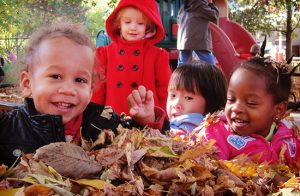 In our program, we follow How Does Learning Happen? Ontario’s Pedagogy for the Early Years and the Ontario government’s early learning framework, ELECT (Early Learning for Every Child Today). The activities that we provide on a day to day basis stem from the needs and interests of the children. The Educators act as facilitators and expand the program based on what happened the day before or what is happening at the moment. This responsive concept of curriculum “planning” fosters individuality and creativity in each child. The hands-on learning environment allows children to change and manipulate their environment according to what they need at any particular time. This enables the children to think and make decisions for themselves, therefore making them feel empowered, which is a huge goal for the children in our Toddler Program.
In our program, we follow How Does Learning Happen? Ontario’s Pedagogy for the Early Years and the Ontario government’s early learning framework, ELECT (Early Learning for Every Child Today). The activities that we provide on a day to day basis stem from the needs and interests of the children. The Educators act as facilitators and expand the program based on what happened the day before or what is happening at the moment. This responsive concept of curriculum “planning” fosters individuality and creativity in each child. The hands-on learning environment allows children to change and manipulate their environment according to what they need at any particular time. This enables the children to think and make decisions for themselves, therefore making them feel empowered, which is a huge goal for the children in our Toddler Program.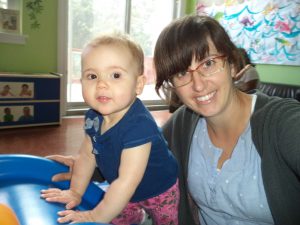 Parents are responsible for providing diapers, creams and wipes. Each child has a special bin labelled with his/her name, where their supplies will be kept.
Parents are responsible for providing diapers, creams and wipes. Each child has a special bin labelled with his/her name, where their supplies will be kept.
When a child begins to show signs of being ready for toilet learning, we will happily work with you and your child. We have a package of information on toilet learning for you, and will be happy to answer any questions you might have. If you think your child is ready, talk to us. We want to work together and make this learning process as happy and successful as possible.
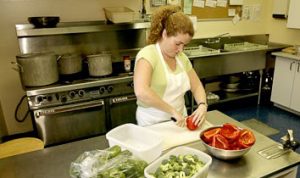 Meals are a very social time. Self-help skills are encouraged, but of course, help is available for those who need it. Children must be sitting while eating and drinking. They are encouraged, but not required, to taste everything. We take into consideration that children’s appetites change from time to time. Their likes and dislikes of certain foods also change. Children drink from cups with or without lids during lunch and snack times. Children’s allergies are posted in the playrooms and in the kitchen, so that all of the staff who interact with the children are informed and aware.
Meals are a very social time. Self-help skills are encouraged, but of course, help is available for those who need it. Children must be sitting while eating and drinking. They are encouraged, but not required, to taste everything. We take into consideration that children’s appetites change from time to time. Their likes and dislikes of certain foods also change. Children drink from cups with or without lids during lunch and snack times. Children’s allergies are posted in the playrooms and in the kitchen, so that all of the staff who interact with the children are informed and aware.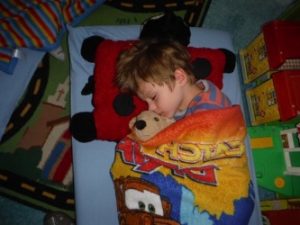 In our sleep room each child has their own cot. If your child has a soother, special blanket, pillow or soft toy that would make them feel more comfortable, we encourage you to bring it in. The sleep room is darkened, with quiet music and a fan. There is always an educator with the children. Naptime usually starts at 12:15 p.m. and ends at 2:45 p.m. at the latest. Children go into the sleep room in staggered, small groups. We encourage the children to fall asleep on their own, but of course there is always a back rub if needed.
In our sleep room each child has their own cot. If your child has a soother, special blanket, pillow or soft toy that would make them feel more comfortable, we encourage you to bring it in. The sleep room is darkened, with quiet music and a fan. There is always an educator with the children. Naptime usually starts at 12:15 p.m. and ends at 2:45 p.m. at the latest. Children go into the sleep room in staggered, small groups. We encourage the children to fall asleep on their own, but of course there is always a back rub if needed.
For those who wake up early we have a Wakers’ Program in the playroom. There are quiet activities set up for the children to explore as they wake.
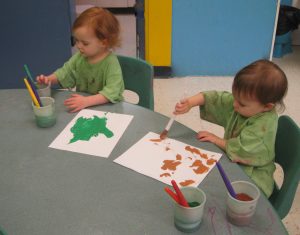 Each child needs to have at least one or two extra changes of clothes (shirts, pants, socks) at the daycare so that wet or soiled clothes may be changed, as needed. They will have their own cubby in which to store their extra clothes and a hook to hang their outerwear on.
Each child needs to have at least one or two extra changes of clothes (shirts, pants, socks) at the daycare so that wet or soiled clothes may be changed, as needed. They will have their own cubby in which to store their extra clothes and a hook to hang their outerwear on.
When children are first toilet learning, 4 to 6 sets of pants, underwear or training pants, extra shoes (we strongly recommend sandals or easily washable shoes for the toilet learning times!) and socks will be needed.
Children need to be prepared to go outside at all times with boots, jackets, hats, sun screen, etc., according to season.
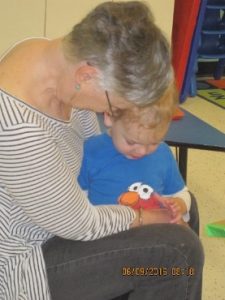
We have three basic rules in this program: safe bodies, safe feelings, and safe equipment. By providing a play-space with fewer restrictions and rules, we believe that the children are more in control of their environment. It is a place that truly belongs to them. This in turn creates a room full of happy children, happy families and happy Educators.
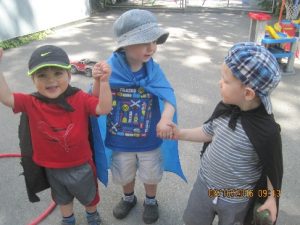 Each day we write a summary of your child’s day with us: what they had for lunch, how long they slept, and other important messages or stories to share.
Each day we write a summary of your child’s day with us: what they had for lunch, how long they slept, and other important messages or stories to share.We also encourage you to share any adventures your child may have had over the weekend, anything you notice that they may enjoy sharing with their friends at day care, any new developments or struggles and any special talents that you would like to share with our program. This helps us provide responsive programming that is meaningful to the children.
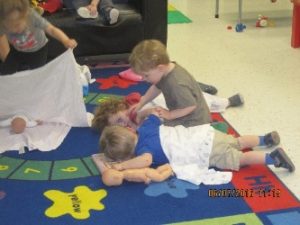
| 7:30 | Welcome/Engaging activities |
| 9:30 | Diapering and Toilet Learning/Outside activities |
| 10:30 | Return Indoors |
| 11:00 | Lunch and Socializing/Hand Washing |
| 11:45 | Bathroom Routine/Free play |
| 12:15 | Nap Time |
| 1:30 | Waking up/Bathroom routine/Free Play |
| 3:00 | Snack Time |
| 5:15 | Activities Tidied/Dressing for departure |
| 5:30 | Centre Closed |
* Please note this schedule is a guideline only and subject to change based on the needs of the children.


